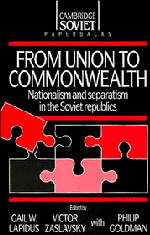Crossref Citations
This Book has been
cited by the following publications. This list is generated based on data provided by Crossref.
Dallin, Alexander
1992.
Causes of the Collapse of the USSR.
Post-Soviet Affairs,
Vol. 8,
Issue. 4,
p.
279.
Simons, Thomas W.
1993.
Eastern Europe in the Postwar World.
p.
226.
Harris, Chauncy D.
1994.
Ethnic Tensions in the Successor Republics in 1993 and Early 1994.
Post-Soviet Geography,
Vol. 35,
Issue. 4,
p.
185.
Miller, Arthur H.
Hesli, Vicki L.
and
Reisinger, William M.
1994.
Reassessing Mass Support for Political and Economic Change in the Former USSR.
American Political Science Review,
Vol. 88,
Issue. 2,
p.
399.
Singh, Anita Inder
1995.
Managing National Diversity through Political Structures and Ideologies: The Soviet Experience in Comparative Perspective.
Nations and Nationalism,
Vol. 1,
Issue. 2,
p.
197.
Balzer, Marjorie Mandelstam
and
Vinokurova, Uliana Alekseevna
1996.
Nationalism, interethnic relations and federalism: The case of the Sakha republic (Yakutia).
Europe-Asia Studies,
Vol. 48,
Issue. 1,
p.
101.
Driver, F
Kemeny, J
Richetto, J P
Lynn, N J
Hodder, R
Busteed, M
Lee, Y F
Stimson, R J
Champion, A G
and
Meaton, J
1997.
Reviews: Spatial Formations, Housing Policy in Britain and Europe, the Flexible Economy: Causes and Consequences of the Adaptability of National Economies, the SOAS/GRC Geopolitics Series 4. Transcaucasian Boundaries, China: Internal Market Development and Regulation, Ireland in the Twentieth Century: Divided Island, toward an Environmental Strategy for Asia, Rapid Urban Environmental Assessment: Lessons from Cities in the Developing World. Volume 2. Tools and Outputs, beyond the Capitals: Urban Growth in Regional Australia, Population Migration in the European Union, the Politics of Nature: Explorations in Green Political Theory.
Environment and Planning A: Economy and Space,
Vol. 29,
Issue. 8,
p.
1507.
Ware, Robert Bruce
and
Kisriev, Enver
1998.
After Chechnya: At Risk in Dagestan.
Politics,
Vol. 18,
Issue. 1,
p.
39.
Ware, Robert Bruce
1998.
Conflict in the Caucasus: An historical context and a prospect for peace.
Central Asian Survey,
Vol. 17,
Issue. 2,
p.
337.
Bunce, Valerie
1998.
Subversive Institutions: The End of the Soviet State in Comparative Perspective.
Post-Soviet Affairs,
Vol. 14,
Issue. 4,
p.
323.
Dostál, P
1998.
Democratization, Economic Liberalization, and Transformational Slump: A Cross-Sectional Analysis of Twenty-One Postcommunist Countries.
Environment and Planning C: Government and Policy,
Vol. 16,
Issue. 3,
p.
281.
Urban, Michael
1998.
Remythologising the Russian state.
Europe-Asia Studies,
Vol. 50,
Issue. 6,
p.
969.
King, Charles
2000.
Post-Postcommunism: Transition, Comparison, and the End of “Eastern Europe”.
World Politics,
Vol. 53,
Issue. 1,
p.
143.
Acton, Edward
2000.
Why Europe? Problems of Culture and Identity.
p.
157.
Hale, Henry E.
2004.
Divided We Stand: Institutional Sources of Ethnofederal State Survival and Collapse.
World Politics,
Vol. 56,
Issue. 2,
p.
165.
Hale, Henry E.
2005.
Why Not Parties in Russia?.
Kolodziej, Edward A.
2005.
Security and International Relations.
Spruyt, Hendrik
2008.
“American Empire” as an Analytic Question or a Rhetorical Move?.
International Studies Perspectives,
Vol. 9,
Issue. 3,
p.
290.
Nuruzzaman, Mohammed
2010.
Federalism and State Disintegration - United Pakistan, 1947-1971: Some Historical Lessons for Afghanistan and Iraq.
Journal of Asian and African Studies,
Vol. 45,
Issue. 5,
p.
504.
Coggins, Bridget
2011.
Friends in High Places: International Politics and the Emergence of States from Secessionism.
International Organization,
Vol. 65,
Issue. 3,
p.
433.



